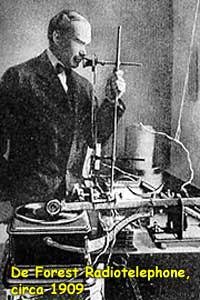Thomas Edison Blows It
 An ordinary light bulb filament, just like the filament of an EM, also gives off electrons—a phenomenon actually discovered by Thomas A. Edison
(1847-1931) shortly after inventing the first practical electric light. It was an odd thing he
noticed when playing around with his new invention.
He'd stuck an extra electrode into the evacuated envelope of his light bulb, and found it would carry a current to ground, though it wasn't physically part of the bulb's circuit. Edison patented this discovery, which he modestly named "The Edison
Effect." The object he's holding in the image at right is the "Edison Effect Tube," in fact. This picture was made in his New Jersey laboratory about 1918.
An ordinary light bulb filament, just like the filament of an EM, also gives off electrons—a phenomenon actually discovered by Thomas A. Edison
(1847-1931) shortly after inventing the first practical electric light. It was an odd thing he
noticed when playing around with his new invention.
He'd stuck an extra electrode into the evacuated envelope of his light bulb, and found it would carry a current to ground, though it wasn't physically part of the bulb's circuit. Edison patented this discovery, which he modestly named "The Edison
Effect." The object he's holding in the image at right is the "Edison Effect Tube," in fact. This picture was made in his New Jersey laboratory about 1918.
 Edison didn't often guess wrong, but in this case he did so in a big way. He felt the Edison Effect was an interesting but essentially unimportant sidelight* of incandescence. Although he patented it as a matter of course, he never did anything with the phenomenon, feeling it had no commercial value. He really guessed wrong on that one.
Edison didn't often guess wrong, but in this case he did so in a big way. He felt the Edison Effect was an interesting but essentially unimportant sidelight* of incandescence. Although he patented it as a matter of course, he never did anything with the phenomenon, feeling it had no commercial value. He really guessed wrong on that one.
It was left to Lee
De Forest (left) to employ the Edison Effect in developing the first vacuum tube. De Forest was able to use these "electric valves" to control radio circuits, the key step which made
commercial radio and TV possible, as well as many other electronic devices,
such as radar, computers, and electron microscopes. The first commercial radio station (it was KDKA in Pittsburgh, still in business almost 90 years later) went on the air just two years after the picture of Edison above was taken.
Today it's De Forest and
not Edison who's known as "The Father of Radio." This must
certainly have galled Edison, who was not only a prolific inventor, but one of
the most driven men of his era. He is said to have managed on only one or two
hours of sleep per night, and to work the rest of the time, seven days a week. He
was a scrappy, competitive guy, and more or less continually embroiled in legal
battles with other inventors over patent rights and priorities. He was what
today would be called a classic "Type A" personality. Of course, Edison had lots of other inventions to his credit (the light
bulb, the phonograph, and motion pictures, to name a few; his is still the all-time record of patents issued to an indivdual, a total of 1093) and he certainly
hasn't been ignored by history. I suspect, though, that by the time he died in
1931 (well after commercial radio broadcasting was a major industry) Edison had gnashed his teeth
more than once over that missed opportunity.
*Pardon the pun, but that was one I couldn't resist.

Close this Window
 An ordinary light bulb filament, just like the filament of an EM, also gives off electrons—a phenomenon actually discovered by Thomas A. Edison
(1847-1931) shortly after inventing the first practical electric light. It was an odd thing he
noticed when playing around with his new invention.
He'd stuck an extra electrode into the evacuated envelope of his light bulb, and found it would carry a current to ground, though it wasn't physically part of the bulb's circuit. Edison patented this discovery, which he modestly named "The Edison
Effect." The object he's holding in the image at right is the "Edison Effect Tube," in fact. This picture was made in his New Jersey laboratory about 1918.
An ordinary light bulb filament, just like the filament of an EM, also gives off electrons—a phenomenon actually discovered by Thomas A. Edison
(1847-1931) shortly after inventing the first practical electric light. It was an odd thing he
noticed when playing around with his new invention.
He'd stuck an extra electrode into the evacuated envelope of his light bulb, and found it would carry a current to ground, though it wasn't physically part of the bulb's circuit. Edison patented this discovery, which he modestly named "The Edison
Effect." The object he's holding in the image at right is the "Edison Effect Tube," in fact. This picture was made in his New Jersey laboratory about 1918.
 Edison didn't often guess wrong, but in this case he did so in a big way. He felt the Edison Effect was an interesting but essentially unimportant sidelight* of incandescence. Although he patented it as a matter of course, he never did anything with the phenomenon, feeling it had no commercial value. He really guessed wrong on that one.
Edison didn't often guess wrong, but in this case he did so in a big way. He felt the Edison Effect was an interesting but essentially unimportant sidelight* of incandescence. Although he patented it as a matter of course, he never did anything with the phenomenon, feeling it had no commercial value. He really guessed wrong on that one. 